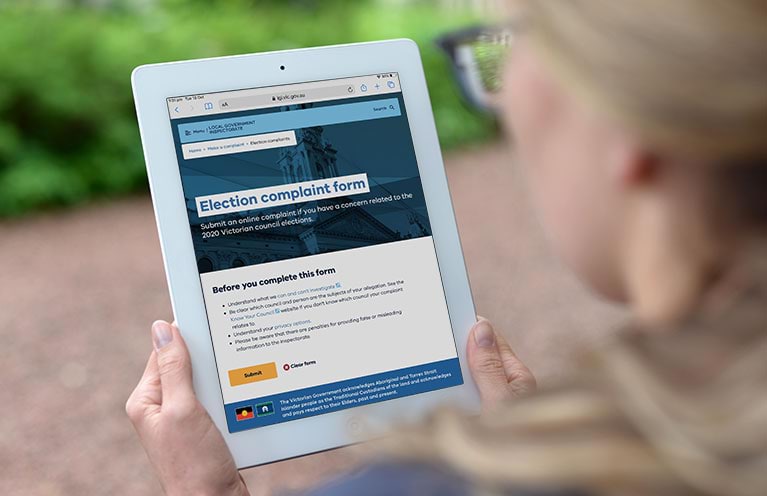- Date:
- 19 Oct 2020
Welcome to the spring 2020 edition of integrity matters. In what has been a most profoundly unusual year, the Local Government Inspectorate has responded well to the tremendous pressure throughout this period. Despite the immense challenges, it’s pleasing to note that the critical processes of local government have continued, including the Victorian Electoral Commission’s ability to deliver 76 elections across the state.
In this edition I would like to share some information about how complaints are directed within Victoria’s integrity agencies, highlight changes we’ve made internally to ensure business continuity, provide guidance around complying with both electoral legislation and the current COVID-19 restrictions while campaigning and raise the coming issue of campaign donation returns.
Last week, complaints relating to this round of local council elections exceeded those received by the Inspectorate in 2016. As of publication, we’re expecting the total volume of electoral complaints to have increased by approximately 40%. While the complaint proportion by topic remains broadly consistent with past elections, the total volume is significantly increased, and we have also received additional complaints relating to COVID-19 issues.
Complaints related to breaches of COVID-19 restrictions fall outside the remit of the Inspectorate as they are matters for Victoria Police. Local Government Victoria and the VEC have also produced resources to ensure your campaigns are conducted safely and they are linked below.
The Inspectorate will provide a clearer picture of the complaint volume and related analysis in our next newsletter. In the meantime, please contact the Inspectorate if you have any concerns regarding this year’s elections.
Dr John Lynch PSM
Acting Chief Municipal Inspector
Increasing coordination between Victoria's integrity agencies
Ensuring the integrity of our local councils is a shared responsibility. The Local Government Inspectorate ensures all Victorian local councils follow the Local Government Act, while our colleagues at the Independent Broad-based Anti-corruption Commission (IBAC) and the Victorian Ombudsman investigate corruption, services and other facets of council operations. Beyond these agencies, it is also the personal responsibility of all Victorians to report suspected wrongdoing.
To demystify the process of making a complaint, the three integrity agencies have come together to break down the types of issues each entity can investigate at the local council level in the new video My local council: if something is not right, who do I complain to? The video also provides clarity around Public Interest Disclosures and the ‘no wrong door’ policy, which ensures all complaints are considered, even if they’re delivered to the incorrect agency.

This new video is the latest collaboration between Victoria’s integrity agencies and the VEC, and it is representative of the increased communication across the sector. Former Chief Municipal Inspector David Wolf has also published a piece on our ongoing collaboration in the integrity space in his new capacity as a Deputy Commissioner at IBAC.
All Victorians are encouraged to raise issues when they arise by whichever means is most convenient: email, phone, or directly via each website.
Managing electoral integrity during COVID
What was expected to be a brief period away from our office has expanded to more than six months working remotely. Nevertheless, LGI has been able to continue preparations for the coming elections and has implemented several innovations to ensure our obligations under the Local Government Act 2020 are fulfilled.
There have been significant digital hardware improvements across the organisation and new secure communication and collaboration tools have been implemented to safeguard business continuity through this critical period.
Despite these steps forward, some issues have unfortunately arisen, and your patience has been appreciated while we rectify them. Chief among these has been our telephone complaints service which was unavailable for several days. We are already in the process of correcting this issue and wish to highlight that it is important all complaints are captured and evaluated.
Should anything prevent you from lodging your complaint via your preferred method, please consider one of the alternatives, including:
- secure online form; or
- email.

Authorisation requirements and safe campaigning
The 2020 local council elections feature some unique challenges. However, the LGI’s role to investigate perceived non-compliance with the Local Government Act 2020 remains unchanged.
With more campaigning now taking place online, the authorisation requirements for social and digital media are a frequent concern with complainants. The VEC’s candidate handbook states:
“All electoral material posted to social media (including platforms like Facebook, Twitter, blogs, websites, and other social media sites) must carry or directly link to an authorisation statement”.
Furthermore, a collection of authorisation examples using popular digital media platforms is now available on the LGI website. This list cannot be exhaustive, so candidates and other participants are urged to refer to sections 287 of the 2020 Act for further reference.
Candidates, commentators and other participants in local council elections should also be aware that any written or oral statements containing electoral matter that are deemed false or misleading may also be considered to breach section 288 of the Act.
In addition to complying with the legal requirements specified in the Local Government Act, candidates should also be aware of the many safety regulations that are currently in place around Victoria. Elections should always be carried out safely and any campaign activities that constitute a risk to people or property may result in legal action.
Local Government Victoria have published Safe Campaigning Guidelines for both metropolitan Melbourne and Regional Victoria and all candidates and their campaign teams should familiarise themselves with these guidelines along with any additional state-wide or local safety regulations.
The Inspectorate can't investigate breaches of COVID-19 restrictions as they are not covered by the Local Government Act. For information on the current restrictions, visit the Victorian Government's coronavirus website.
Mandatory campaign donation returns
While candidates’ focus is understandably on election day, there are important processes that are required to ensure integrity and transparency in the weeks that follow.
All candidates in Victorian Council Elections are required to submit a record of any donations or gifts valued at over $500 (aggregate or individually), including in-kind support or gifts in the form of services, for their election campaign. This applies to all candidates, irrespective of whether they receive any donations or gifts, or whether they were elected. It also covers a wide period as all donations or gifts that were above the threshold and received from 30 days after the previous election to 30 days after the current election must be declared.
For most candidates this is 20 November 2016 - 23 November 2020 but please check with the CEO of the council for which you nominated.

The required donation return form is included in the Victorian Electoral Commission’s 2020 local council elections candidate information kit and must be returned to the CEO of the council.

